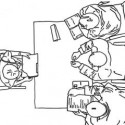I was delighted to discover that Wayne Coppins is blogging (via Christopher Skinner), and a quick perusal had me subscribing immediately.
I also perused his “Roadmap for Aspiring New Testament Scholars” which is full of useful information for folks at various stages of their academic career, especially early stages. One part I enjoyed was a recollection of advice Martin Hengel gave to Coppins which I quote at length:
1) Sit down and write your dissertation;
2) Make a selection of the most important works from the secondary literature, and give priority to the full range of relevant primary sources;
3) The real art of a scholar resides in the ability to improve what s/he has written.
In putting the first point first – “Sit down and write your dissertation!” – I understood Hengel to be conveying to me that I needed to get on with the work rather than endlessly worrying that I was not ready or it was not yet perfect. This was constructive as an answer to my perfectionist tendencies, which tend to result in paralysis.
For me, the second point proved especially helpful: “Make a selection of the most important works from the secondary literature, and give priority to the full range of relevant primary sources.” First, this freed me up to begin developing my thinking in relation to a selection from the massive secondary literature, rather than feeling that I should first read everything out there. This was constructive insofar as the process of reading and reading and reading and reading had the effect of making me feel overwhelmed, whereas beginning to develop my thinking in relation to a selection of sources proved more manageable. (Plus, had I adopted it at the outset, this strategy might have saved me from spending a whole year reading – and photocopying! – everything about one topic, only to realize later that I did not want to continue working on that research question.) Secondly, it reinforced my conviction that fresh thinking often takes place through interaction with the primary texts, though I would also want to stress as a corrective that it is often the secondary literature that helps us to inform and reshape our thinking in such a way that we can interact competently with the primary sources.
Hengel’s third observation – “The real art of a scholar resides in the ability to improve what s/he has written” – likewise served to constructively disable my perfectionist tendencies by driving home the point that researching and writing a PhD is a multi-stage process. In other words, it freed me up to allow myself to produce flawed work, with the understanding that I would indeed have the opportunity to improve what I had written, and that I might be better able to do so if I allowed my argument to develop further before attempting to go back over it. Similarly, I can remember Graham Stanton once looking over my draft work and then saying something like, “Well, this is not what we want, but let’s press on and we can return to it”; his point being that now was not yet the time for revision, and that I should be free to move on.


